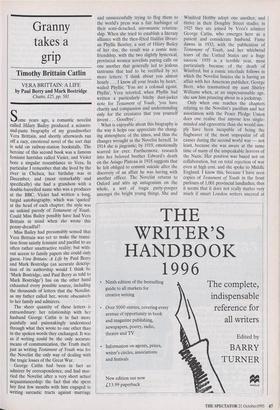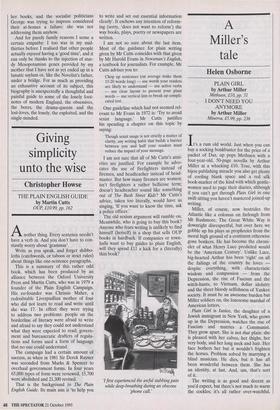Granny takes a grip
Timothy Brittain Catlin
VERA BRITTAIN: A LIFE by Paul Berry and Mark Bostridge Chatto, £25, pp. 581 Some years ago, a romantic novelist called Hilary Bailey produced a scissors- and-paste biography of my grandmother Vera Brittain, and shortly afterwards ran off a racy, emotional novel of the sort that is sold on railway-station bookstalls. The heroine of this second book was a famous feminist harridan called Violet, and Violet bore a singular resemblance to Vera. In particular I remember that she lived by the river in Chelsea, her birthday was in December, and (most remarkably and specifically) she had a grandson with a double-barrelled name who was a producer at the BBC. Violet had written a long, turgid autobiography, which was 'quoted' at the head of each chapter; the style was an unkind parody of Testament of Youth. Could Miss Bailey possibly have had Vera Brittain in mind when she wrote this penny-dreadful?
Miss Bailey had presumably sensed that Vera Brittain was yet to make the transi- tion from saintly feminist and pacifist to an often rather unattractive reality; but with- out access to family papers she could only guess. Vera Brittain: A Life by Paul Berry and Mark Bostridge (an accurate descrip- tion of its authorship would I think be `Mark Bostridge, and Paul Berry as told to Mark Bostridge') has on the other hand exhausted every possible source, including the thousands of letters that the Novelist. as my father called her, wrote obsessively to her family and admirers.
The sheer quantity of these letters is extraordinary: her relationship with her husband George Catlin is in fact more painfully and painstakingly understood through what they wrote to one other than in the spoken words they exchanged. It was as if writing could be the only accurate means of communication, the Truth itself. just as writing Testament of Youth was for the Novelist the only way of dealing with the tragic losses of the Great War.
George Catlin had been in fact an admirer by correspondence, and had mar- ried the Novelist after a very short actual acquaintanceship: the fact that she spent her first few months with him engaged in writing sarcastic tracts against marriage
and unsuccessfully trying to flog them to the world's press was a fair harbinger of their semi-detached, unromantic relation- ship. When she tried to establish a literary alliance with the then-feted Halifax librari- an Phyllis Bentley, a sort of Hilary Bailey of her day, the result was a comic non- friendship, with the two slightly hysterical, provincial women novelists paying calls on one another that generally led to jealous tantrums that had to be rectified by yet more letters: 'I think about you almost hourly . . . I know all your frocks by heart,' wailed Phyllis; 'You are a colossal egoist, Phyllis', Vera retorted, when Phyllis had written a particularly bitchy dust-jacket note for Testament of Youth, 'you have charity and compassion and understanding only for the creatures that you yourself invent . . . Goodbye'.
What is enjoyable about this biography is the way it helps one appreciate the chang- ing atmosphere of the times, and thus the changes wrought in the Novelist herself. In 1914 she is jingoistic; by 1919, emotionally scarred for ever. Furthermore, research into her beloved brother Edward's death on the Asiago Plateau in 1918 suggests that he felt obliged to commit suicide after the discovery of an affair he was having with another officer. The Novelist returns to Oxford and stirs up antagonism on the whole, a sort of tragic party-pooper amongst the bright young things. She and
Winifred Holtby adopt one another, and thrive in their Doughty Street studio; in 1925 they are joined by Vera's admirer George Catlin, who emerges here as a patient and considerate husband. Fame dawns in 1933, with the publication of Testament of Youth, and her whirlwind tours of the United States are a huge success. 1935 is a terrible year, most particularly because of the death of Winifred, but a comic interlude follows in which the Novelist fancies she is having an affair with her American publisher, George Brett, who traumatised my aunt Shirley Williams when, at an impressionable age, she saw him prancing about in a jockstrap. Only when one reaches the chapters relating to the Novelist's pacifism and her association with the Peace Pledge Union does one realise that anyone less single- minded and egocentric than she would sim- ply have been incapable of being the flagbearer of the most unpopular of all causes during the second world war — not least, because she was aware at the same time of many of the unspeakable horrors of the Nazis. Her position was based not on collaboration, but on total rejection of war even at high cost. and she spoke to Middle England. I know this, because I have seen copies of Testament of Youth in the front parlours of 1,001 provincial landladies; thus it seems that it does not really matter very much if smart London writers sneered at her books, and the socialist politicians George was trying to impress considered their at-homes a failure: she was not addressing them anyhow.
And for purely family reasons I sense a certain empathy: I too was in my mid- thirties before I realised that other people actually enjoyed having a 'good time', and it can only be thanks to the injection of stur- dy Mesopotamian genes provided by my mother that I have not as yet ended up in a lunatic asylum or, like the Novelist's father, under a bridge. For as much as providing an exhaustive account of its subject, this biography is unexpectedly a thoughtful and painful guide to some of the lonely foot- notes of modern England, the obsessives, the bores, the drama-queens and the lost-loves, the lonely, the exploited, and the single-minded.











































































 Previous page
Previous page